Casper, the hammered 1968 Ford four-wheel-drive pickup rattled across the expansive sagebrush of Eighteenmile flats. The blinding glint of the rising sun was just creeping over the Beaverhead range and shone brightly through the dirty windshield. I looked behind me in the cracked mirror at the dust plume that launched skyward. The dirt cloud fairly glowed in the rose orange of the low sun, and I could see the shadow of my pickup cast against it. I had my saddle propped up behind me in the open bed; every surface of it would be caked with volcanic dust when I’d have to throw it on the horse that awaited me at the Hawley Creek camp. I pushed my headlights off as the warm glow from the sky drove out the night.
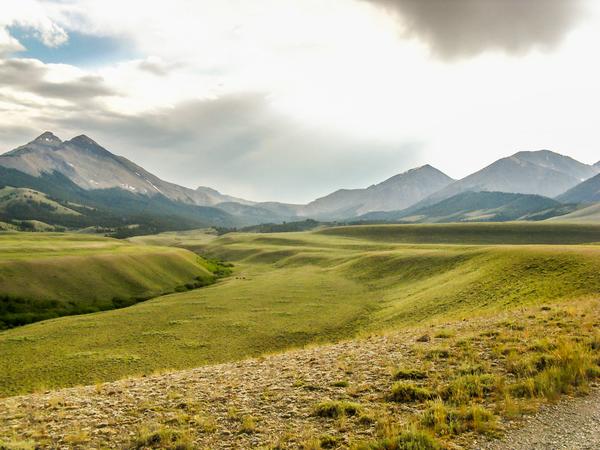 The gravel track wearily wound toward the mouth of the Canyon that marked the boundary between valley and mountain. Now, the remaining 8 miles up to the foothills was arrow straight. It looked flat, but Casper’s ancient straight six engine started shaking on his mounts, and I grindingly grabbed the next gear down on the 3 speed relic as we climbed up the mile wide gravel bar. In another minute, I was back in the shadow of the Beaverhead; in another, I was in the darkened trees and boulders of the canyon mouth that had not yet seen daylight.
The gravel track wearily wound toward the mouth of the Canyon that marked the boundary between valley and mountain. Now, the remaining 8 miles up to the foothills was arrow straight. It looked flat, but Casper’s ancient straight six engine started shaking on his mounts, and I grindingly grabbed the next gear down on the 3 speed relic as we climbed up the mile wide gravel bar. In another minute, I was back in the shadow of the Beaverhead; in another, I was in the darkened trees and boulders of the canyon mouth that had not yet seen daylight.
Lloyd told me where cow camp was, but it had been years since I was in Hawley Creek, and couldn’t visualize where it sat. I figured I’d find him by a little woodsmoke and graying corral poles. I meandered up the canyon, slow like, and the valley opened up a bit into a broad meadow. The very tops of quaking aspen and Douglas-fir along the edges glowed warmly in the rising sun. At the end of the meadow, smoke-filled shafts of sunlight spilled through the matrix of pine trees. I rolled to a stop at the source of the blue haze. Lloyd’s crinkled and time-worn face atop sweat stained and trail-worn clothes filled the door of the ramshackle camp shack as smoke curled out the stovepipe beyond him. He wore the same hat he always had on the ranch. I swear those were bulletholes in it. Four steeds looked on from the pole corral next to the shack. I untangled my tall and skinny frame from the pickup.
His steel-on-gravel voice didn’t wait for me to shut the door. “‘Bout time you showed up.” He grinned. Lloyd’s smile was actually quite captivating in spite of the fact that most of his teeth had taken early retirement. Maybe it was the sparkles of gold filling you could spot deep in there. “I got hot bacon grease needing a hotcake in it.”
And he did. I stepped into the mouse-ridden shack, and he had a cowboy-sized steaming pile of freshly fried crispy but ever-so-thick bacon that was a fixture on his breakfast menu. Hot grease a quarter to half inch deep (depending on which side you looked at it) sat waiting in a cast iron skillet over the little woodstove. He dropped some batter in the pan and it sizzled to life. After just a minute in the hot grease, he flipped flapjack over; soon enough, a tall stack of a cross between deep fried bacon flavored scone and hotcakes grew on a chipped plate resting on the rough-cut table. Sorghum syrup and butter completed the calorie load. Lloyd liberally poured big tin cups of thick, boiled and a little burnt coffee from a blackened pot. I tried to envision breakfast like this every day, and guessed that the thickly fragrant and chill mountain air ratcheted appetite up enough to eat roadkill.
“Feller’s gotta have enough for horseback all day, you know.” He winked as he stuffed a flapjack in his coat pocket that hung on the nail behind him. “We’ll make a big circle through the whole of Hawley. Just gotta make sure we ain’t got no strays piling off the ridges.” He slipped on his torn denim coat. “Should take us most of the day.”
We stepped out of the closeness of the shack into the brisk open air under the pines. I grabbed a bridle off fencepost where they hung, as did Lloyd, and caught the gelding I usually rode as he did his. Lloyd threw his ancient highback saddle on the back of his sorrel horse who stood patiently as the 75 year old cowboy threaded his long leather latigo and pulled cinch tight underneath. He turned toward me, gravelly voice uttering another life lesson.
“I don’t go back through the flat part of the loop with my latigo end on the cinch ya’know. I just fold it over like this.” He showed me, and smiled, followed by a trademark wink. Then he looked serious again. “I’ve never had one come loose. But if a feller needs to make it loose, all he’s gotta do is pull this.” He pulled, and the cinch popped free. Lloyd smiled again. “say yer critter get’s piled up in some timber. Ya can just pull his gear”¦just like that.”
While I was pondering the new lesson, he turned, lifted his foot high into hoop stirrup, and swung again, probably for the forty thousandth time into the creaking saddle.
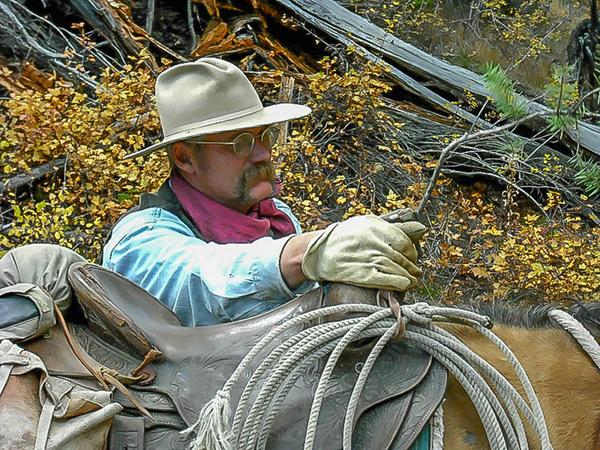
“‹”‹”‹”‹”‹”‹”‹
As he had his back to me, leaning over to check his “off” stirrup (cowboy word for right hand side of your mount), I checked out Lloyd’s gear while tending to mine. The wear on his clothes, even his body, blended seamlessly into the leather and wool beneath him. The gear must be some fifty or sixty years old; perhaps more. His saddle was worn thin and supple by years of use and sweat under Lloyd’s compact 75 year old frame. All of the features on his gear were now ancient tributes to how the West was won; nobody I had met still rode in such gear with ring stirrups and such a tight seat. The time-worn leather, I realized, was proof; a complement to the stories he regaled me with whenever we rode.
“Them critters [horses] were sure different back then.” He would say. “Most of them were bronc-ey, and we just rode ’em.” No time was spent training mounts. Cowboys then simply didn’t waste the time to try to school their steeds before they climbed on board. They simply got on completely unrode and green horses and said “come what may.”
And they lived a life inextricably intertwined with the landscape. He told me stories of packing gear and teams of mineral surveyors on the first assays in much of the mountains in this part of the West for several years. They lived off the land for weeks at a time, and Lloyd provided them gear and grub as the geologists created some of the first mineral maps of the remote country of the Rocky Mountain West.
He told tales of moving by covered wagon long before internal combustion came to the country; of the many rank horses he rode; of the first telephone lines; of blizzards and brutally hot summers. The stories never stopped. I only wish I captured them; unfortunately, they finally did halt when Lloyd finally passed away several years later. I had come up to help him this particular August day just because he asked me to. I figured then that he gets lonely up in camp sometimes, and a week will go by when he’ll never see another soul. It was just him and cows on this reach of the Continental Divide after all. His range sat right on the wilderness border between Idaho and Montana where jagged horizon scraped the sky at 8000 feet. There wasn’t a soul for miles.
But now, 25 years later, I’m thinking the real reason I rode with him was because there was so much to learn about horse, cattle and history, and he knew I needed to hear about it. I’d been through five and a half years of college, but here was an education that made all earlier pale because old boys like Lloyd taught me the lessons of life and living, and what mattered by my reckoning that only life on the land and common sense of hard knocks could give. I was a sponge, and I just couldn’t get full. I had found an insatiable passion that only time with these people of the land could begin to satisfy.
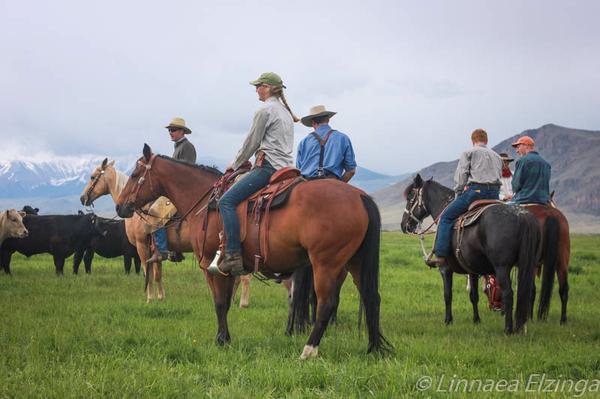
I soon realized that the other half of what would fill or meet that passion it was actually living it out. It’s why we bought a ranch in the first place. But such fancies of ranching drove my alternate reality of a day job as a forester to a breaking point. I had been working on various ranches for experience, and Caryl and I had gathered what money we had and bought a small starvation outfit of 145 acres and seven cows. Bovines then had babies, and with a borrowed bull the laws of fecundity took over and before I knew it, I got busy.
Within a few years, I was burning the candle at both ends (sometimes in the middle) and found myself sleeping up in the meadows on several long days after midnight trying to keep up on my fences or moving cattle. I’d just curl up under a tree with my slicker on and pass out for a while. I couldn’t keep my eyes open after four or more 20 hour days back to back.
After one of these interminable nights, the next morning, exhausted, there wasn’t enough stout coffee that could bring me back to life. I stumbled into the forestry office where I worked. I had a dang good job of 15 years and good money and a great crew working for me. I was on time, but my brain was somewhere behind me, maybe coming down highway 28 from the ranch. Or perhaps it was still sleeping by one of those trees that bordered my hay meadows.
Thank God; we had a meeting to go to. Maybe my mind could catch up to and reoccupy my chronically fatigued frame. It was a safety meeting, and all 30 employees were in attendance. It was the early 90’s, and computer connectivity was just barely creeping into our government office by dial-up. The subject matter toward the end of the meeting was that with this new technology would be temptation by employees to spend time on this thing called the “internet” in things inappropriate to their job description. The computer guru droned on about the risks of using company time to do personal or inappropriate browsing”¦
My mind caught up with body and I had a flash of clarity. I knew right then I needed to make a choice, because although I would never get wooed by this computer thing, there was something else that begged my attention away from my forestry job: the ranch. I was less than effective at my job. Either the ranch would have to go or the day job. Yep. It was plain as punch.
I may have been a little too tired to really think through the ramifications, but I slowly stood up, interrupting less than lively discussion about the conflicts with work and the internet thing. “Can I say something?”
All heads turned toward me, expectantly. I suddenly realized, a little sheepishly that they were thinking I had some kind of computer question or internet confession to make, but I plowed on anyway. I never was one for good timing. “I got priorities. They go like this. God”¦my family”¦ and me”¦and then this here job. Yep. This job is last…and I’m afraid it might be starting to show with the hours I got going on. So this is it. This here’s my two weeks notice.”
Silence in the room. Surprised and stunned looks. I was the head forester. It was a great job that I actually liked. I worked with good people. I had a 401 K and benefits. And one of the best wages in the little mountain community of Salmon, Idaho. But the golden handcuffs of all those secure pleasantries fell and rattled to the tiled floor at my feet. I stepped over them, and within a couple weeks, I emptied my desk of very little, turned in all my timber measurement gear, including my precious hand compass, clinometer, and Relaskop and exited the compound for the last time.
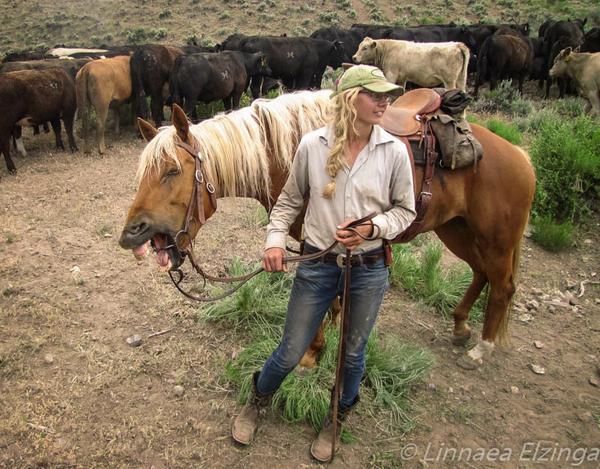
I’ve never looked back and wished for the security, even though I found out that there is none in the ranch. And that’s hard; especially on Caryl. It’s why ranch country and the American outback that we live in can be really hard on moms who make a home; who plant trees and flowers”¦and may lose it all. Bad decisions, brutally brittle weather, low cash flows, and markets take that security away. Even direct marketing beef has its woes; stores demand price breaks, longtime customers die, disappear, move or buy from the latest cool and sexy beef purveyor. It’s just business.
But then, there’s some pure pleasure that keeps us going on. The land under our care continues to improve in productivity and diversity. We have kids (7 girls) who know the value of life and good hard work. They know how to partner with a horse, and convince that beautiful animal to carry them to places unknown. Returning salmon from the Pacific Ocean happily spawn in our now protected river bottoms. Aspen trees and willows recolonize the range as we carefully protect the young shoots from grazing by herding our cattle full-time. Vigorous stands of wild grasses wave in the wind over many square miles of wild rangeland, even where we graze. Our cattle shine, glossy in the sun, the picture of wellness, and their yield from pasture to plate is better in quality than ever. Many of these are intangibles; they aren’t stuff. They are ideas; they are beauty.
Lloyd Clark would have understood.
I wept at his graveside a few years after I rode with him up Hawley. He was buried in the McRae family cemetery, just across the valley from cow camp. It was a bright, sunny day, with a hot breeze coming off the high desert. I could see the mouth of the canyon across the 15 miles of Eighteen Mile flats. The flats shimmered with heat; mirages of lake and sea danced across the landscape. His grandson, Mike and I stood by each other as they lowered him in the ground. Like me, Mike had spent quite a time on the land with Lloyd. His stories and persona were indelibly marked on our hearts and minds, and we broke for it.
About a week after the burial, I met Lloyd in a dream. He looked younger, and quite happy. I think he was fixing fence. Come to think of it, he was always mending fence. He still wore the same battered hat and trail worn clothing complete with brown-dirt Levis, and looked up at me coming when I recognized him. He was in the front of his weather-beaten log homestead on Tex Creek on the other side of the Eighteen Mile flats. He read my face as I approached, and shook my hand. I had nothing to say. I couldn’t. But he did: “It’s going to be all right. You’ll do just fine.” He looked at me straight on and smiled. And I woke up.
Lloyd was right. It is all right. And he isn’t completely gone, because in my mind’s eye, I’ll always remember him with a smile because of the lessons he taught me. And part of who he was makes our ranch, our beef, and our relationship to the land what it is today. Thanks for being a part of what he passed on.
Happy Trails.
Glenn, Caryl, Girls and Cowboys at Alderspring.

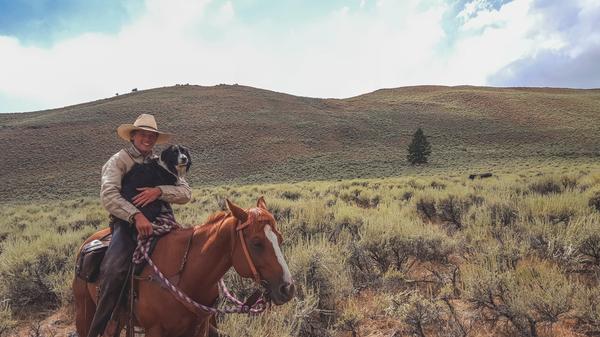

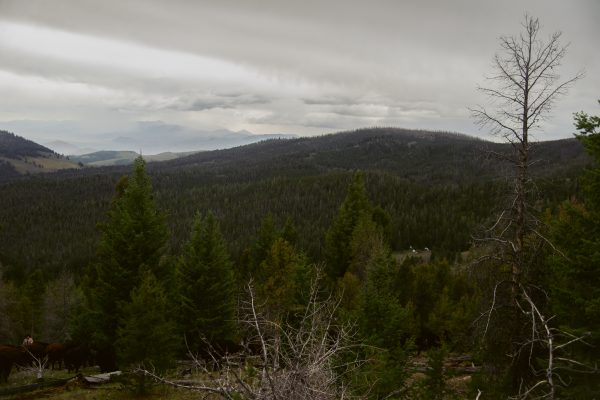
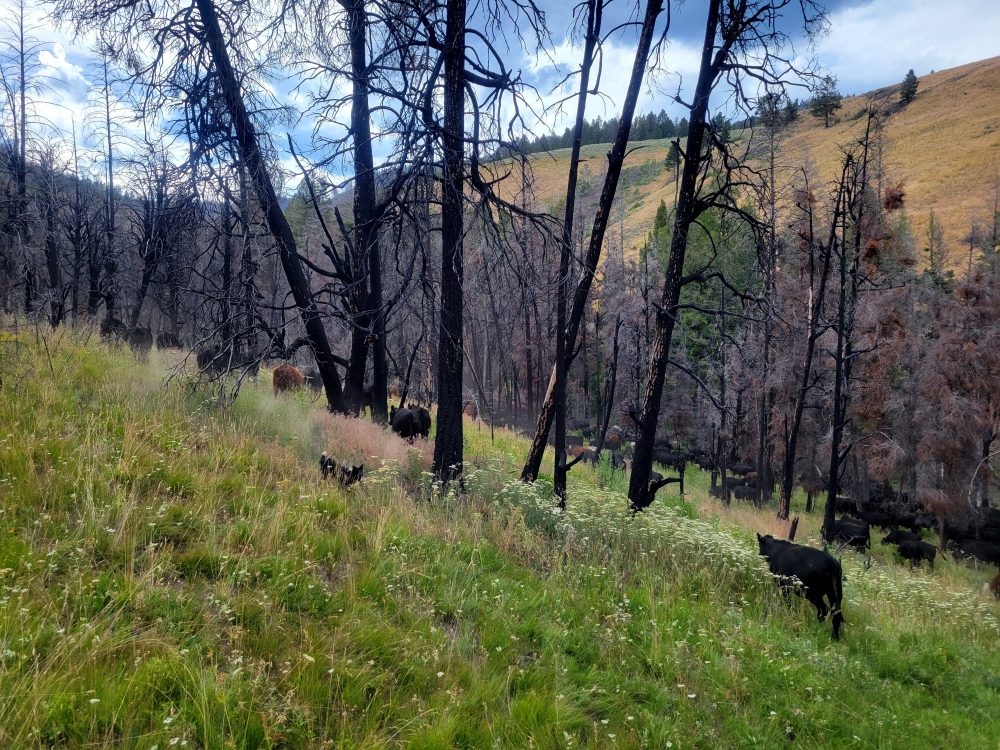
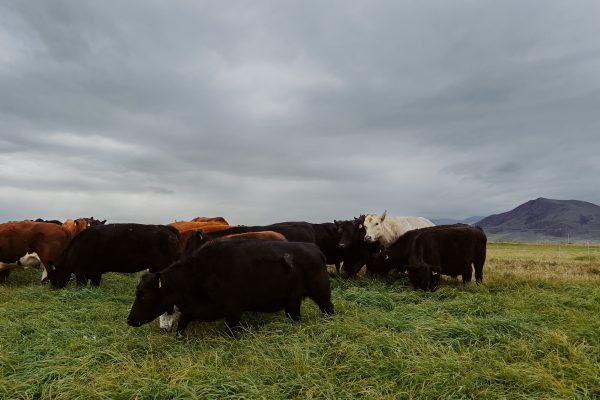

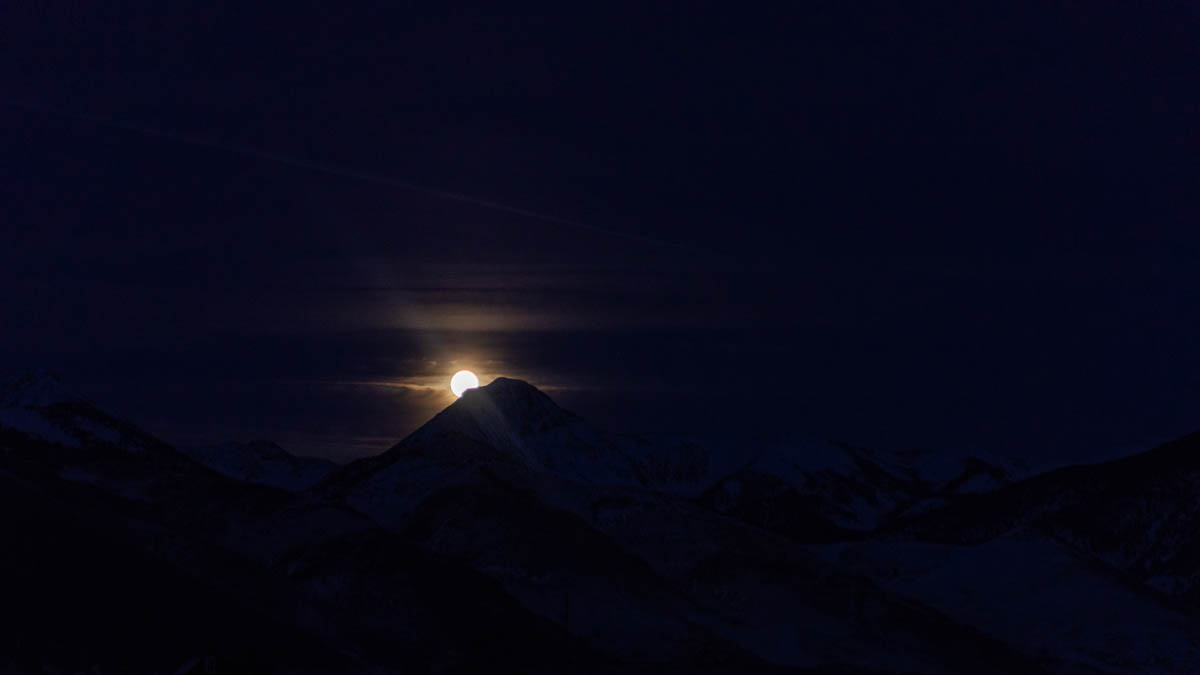
Leave a Reply